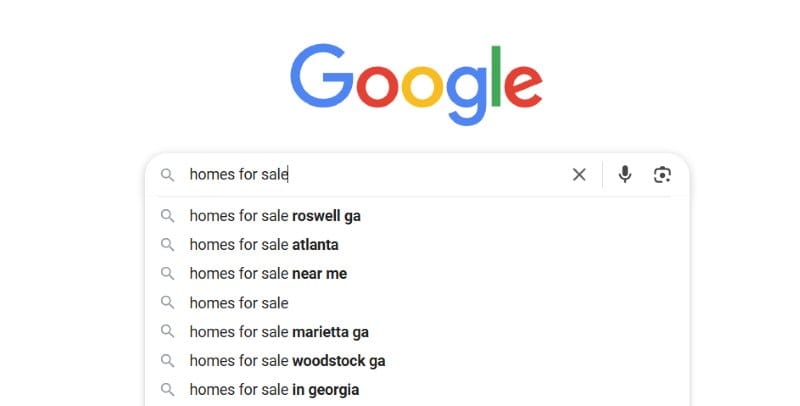Top Real Estate Keywords Homebuyers Search (and How to Rank for Them)

Jump to section
Google has replaced the open house sign. These days, most homebuyers start their journey with a search bar. But they’re not just typing “homes for sale near me” and calling it a day. Their real estate keyword searches are specific, sometimes oddly phrased, and loaded with intent.
The question is: are you showing up when they do?
Knowing which keywords homebuyers actually search for—and how to rank for them—is one of the simplest, most effective ways real estate agents can attract high-quality leads. In this guide, we’ll break down the top real estate keywords buyers use on Google, and show you how to build content that ranks.
What real estate keywords are homebuyers actually searching?
When someone starts looking for a new home, their searches aren’t always about bedrooms and price ranges. In fact, those terms usually come later. What they’re really Googling first looks more like:
“Best neighborhoods in Atlanta for young professionals”
“Are home prices dropping in Georgia?”
“Top school districts in North Fulton”
“Safe walkable areas in Decatur”
“Homes near BeltLine under 600k”
These aren’t just passing curiosities, they’re research. And the more specific the question, the closer that buyer is to taking action.
Most agents focus on ranking for broad terms like “real estate in [city],” which makes sense at first glance. But those keywords are extremely competitive, and they don’t tell you much about buyer intent. Someone searching “Marietta GA homes for sale” could be a casual browser, months away from moving—or just daydreaming.
The more useful strategy? Aim for the kinds of search terms that reveal what someone actually cares about.
Top real estate search terms you should know

Below are some of the most common phrases homebuyers type into Google. You’ve probably used some of them yourself without thinking twice.
“Homes for sale in [city/neighborhood]”
Still valuable—especially if your site has good indexing and fresh listings.“Real estate agent near me”
A hyper-local phrase that makes your Google Business Profile crucial.“How much house can I afford?”
These searchers are early in the process but serious about budgeting.“First-time homebuyer programs in [state]”
Tons of intent here. They’re actively trying to make the numbers work.“Best areas to live in [city]”
Broad but high-interest. Great for blog posts and neighborhood pages.“School ratings in [county or zip code]”
School searches usually signal long-term buyers (often families).“New construction homes in [suburb]”
Useful for agents working with builders or newer subdivisions.
These aren’t just keywords—they’re doorways. They tell you where the homebuyer is mentally and how close they might be to making a decision.
What real estate keywords say about buyer intent

Every search a potential homebuyer types into Google tells you something about where they are in the process.
When someone Googles “Atlanta homes for sale”, that’s broad. It could mean they’re thinking about relocating next year, or they’re just browsing on a lunch break. It’s a high-volume keyword, yes, but it’s also high up the funnel. There’s curiosity, but not necessarily commitment.
Now compare that to someone searching “3 bedroom townhomes in Alpharetta under 500k with a finished basement.”
That’s someone who’s done their research. They’ve narrowed their location, budget, home type, and even features. They’re deep in the funnel, and they’re probably ready to tour, apply, or submit an offer.
Understanding this difference is huge for agents.
Broad keywords are great for brand awareness, capturing casual browsers, and building traffic over time.
Specific, long-tail keywords are better for leads. These are the buyers who know what they want—and are looking for someone to help them find it.
If your site content only targets broad search terms, you’re going to miss the people who are actually ready to move.
Why long-tail keywords are your best friend

Short, broad keywords like “homes for sale” get tons of traffic—but good luck ranking for them. You’re competing with Zillow, Redfin, Realtor.com, and every other high-authority site on the internet. Even if you did show up on page one, you’d be buried in ads and noise.
Now take a phrase like “4 bedroom homes with a finished basement in East Cobb under 700k.”
Fewer people search that exact phrase, sure—but the ones who do are laser-focused. They know what they want, and they’re probably ready to take the next step. That’s the power of long-tail keywords.
Long-tail searches are more like full thoughts. They’re specific, less competitive, and much easier for local agents to rank for, especially if you build content around them. Here’s what that might look like in practice:
Examples:
Someone searches: “Is Alpharetta good for remote workers?”
You write a blog post about neighborhoods in Alpharetta with great internet, coffee shops, and coworking spaces.
Someone searches: “Homes near Atlanta BeltLine under 500k”
You create a landing page featuring listings, a map, and tips for buying in that price range.
Someone searches: “Best suburbs of Atlanta for families with toddlers”
You write a post comparing Roswell, Peachtree City, and Milton with school data and park access.
The more your site mirrors these real-world queries, the more likely you are to show up right when it matters most.
Tools to find long-tail keywords
You don’t need expensive tools to find these phrases. Start typing a question into Google and watch what it auto-fills.
Look at the “People also ask” box. Scroll to the bottom for related searches. These are free insights into exactly how people are thinking—and searching.
For deeper research, you can use tools like:
SEMrush: Their Keyword Magic Tool helps uncover long-tail variations of your target keywords.
Ahrefs: The Keywords Explorer tool provides a list of long-tail phrases based on search volume and difficulty.
Google Keyword Planner: It’s free and simple to use, offering keyword suggestions directly from Google.
Ubersuggest: A budget-friendly option with long-tail keyword suggestions and competitive analysis.
These tools help you discover search terms you might never have thought of, giving you a more complete view of what homebuyers are actually looking for.
How to actually rank for these search terms
Knowing what buyers search for is half the battle. The other half? Giving Google (and your audience) something worth finding.
Here’s how agents can start showing up for those high-intent searches without getting buried by the big listing sites.
1. Build neighborhood-focused pages
You don’t need a site that covers the whole state. You need pages that go deep on the areas you actually serve. Think:
“Living in Candler Park: What Buyers Need to Know”
“Guide to Smyrna, GA: Schools, Parks, and Homes for Sale”
“Homes with Land in Cherokee County”
Each of these pages should include:
A short intro about the area (keep it conversational)
Why people move there
Popular home styles and price ranges
Embedded listings
Photos or videos
Local landmarks or walkability highlights
Google loves original, local content that answers actual questions. These pages help you do exactly that.
2. Write blog posts that answer real buyer questions
If you’re answering the questions people are Googling, you’re giving search engines a reason to trust—and rank—you.
Try blog titles like:
“What’s the Catch? Why That House in Buckhead is Priced So Low”
“Buying a House in a Seller’s Market: Atlanta Edition”
“Top 5 Walkable Neighborhoods in Midtown”
Pro tip: Every time a buyer asks you something IRL, write it down. That’s your content calendar.
3. Optimize your Google Business Profile (GBP)
A lot of local real estate searches skip websites altogether and pull directly from Google Maps. If your Google Business Profile is dialed in, you’re more likely to show up for “real estate agent near me” or “[neighborhood] homes for sale.”
Make sure your profile includes:
Accurate categories (use “Real estate agent” not “Company”)
A strong description with a few location-based keywords
Business hours and service areas
Photos (your face, listings, happy clients)
Regular posts or updates
Plenty of recent reviews that mention neighborhoods and property types
📌 Want to make sure your profile is fully optimized? Check out my Google Business Profile Guide for step-by-step tips on how to set it up and optimize your profile.
4. Use Schema markup
Schema markup is code that helps Google understand what your page is about. It can boost your chances of showing up in featured snippets, map packs, and other rich results.
Focus on:
RealEstateAgent schema
FAQ schema (especially for blog posts answering buyer questions)
Review schema (when embedded correctly)
If that all sounds intimidating, plugins like Rank Math or Yoast SEO (on WordPress) can make it simple.
Quick wins: Easy places to add these keywords today
You don’t need a total site overhaul to start showing up in search. Sometimes, small tweaks go a long way—especially if you know where to look. Here are a few quick wins for getting those high-intent keywords onto your site without breaking anything.
1. Rename blog posts and pages
If you’ve got older posts with vague titles like “Buying Tips” or “Neighborhood Spotlight”, give them a refresh. Add specific keywords like:
-
“Buying a Home in West Midtown: What You Need to Know”
-
“Grant Park vs. Cabbagetown: Which Neighborhood Is Right for You?”
Make sure the slug (the part of the URL after .com) and meta title match, or come close.
2. Update your photo alt text
Google can’t “see” images—but it reads the file name and alt text. If you’re uploading listing photos, neighborhood shots, or even lifestyle imagery, describe them with keywords like:
-
“3 bedroom home in Sandy Springs with large backyard”
-
“Midtown Atlanta condo near Piedmont Park”
-
“Open concept kitchen in Buckhead home for sale”
Bonus: it helps with accessibility and image search rankings, too.
3. Add keyword-rich FAQs to service or landing pages
You don’t have to write an entire blog post to rank for a question. Just add a short FAQ section to the bottom of your page with questions like:
“What’s the average home price in [city]?”
“Is [neighborhood] walkable?”
“How long does it take to close on a house in Georgia?”
Keep the answers concise and natural—think one or two sentences.
4. Sprinkle keywords into your about page and bio
Too many agent bios focus only on credentials and personality. That’s great, but you should also mention where you work and who you serve.
Instead of:
“I’m passionate about helping people find their dream home.”
Try:
“I help first-time homebuyers and growing families find homes in North Decatur, East Atlanta, and surrounding neighborhoods.”
5. Use long-tail keywords in listing descriptions
Don’t just describe what the house has—describe what people search.
Say:
“Modern 4-bed home in East Cobb with finished basement and fenced backyard.”
Not:
“Beautiful home with upgrades throughout.”
If your MLS allows it, use headings or paragraph breaks for better formatting and scannability.
It’s not just about traffic—it’s about the right traffic
Ranking for real estate keywords isn’t about chasing the biggest numbers. You don’t need 10,000 clicks from people browsing out of boredom. You need 10 clicks from people who are ready to tour homes, meet with an agent, or make an offer.
That’s what long-tail, intent-driven keywords deliver. They don’t just bring more traffic—they bring the right kind of traffic.
The buyers who Google “homes near top schools in Johns Creek” aren’t casually scrolling. They’re planning. And when your site shows up with helpful, localized content that speaks directly to their search, they’re a lot more likely to stick around—and reach out.
Want to start showing up in those searches?
Use this post as a checklist. Update your site. Build out pages for the neighborhoods you know best.
Think like your buyer, and write like a human.
And if you want help finding those high-intent keywords, auditing your website, or building an SEO strategy that actually works, get in touch with me.

